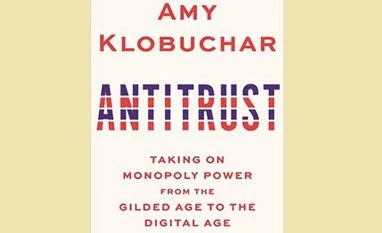Author: Amy Klobuchar
Publisher: Alfred A Knopf
Price: $32.50
Pages: 624
More From This Section
A history of antitrust policy may not sound like the most compelling raw material for a page turner. But the book is an impressive work of scholarship, deeply researched — it has over 200 pages of footnotes — highly informative and surprisingly readable in the bargain.
As a good Minnesotan, Ms Klobuchar traces the roots of antitrust to the Midwest, when farmers rebelled at the end of the 19th century against the exploitative practices of the railroads. The movement spread from the Prairie States to Washington, D.C. Many industries at the time were controlled by business combinations known as trusts. There were trusts in petroleum, meatpacking, railroads, sugar, lead, coal, whiskey and tobacco. By restricting competition the trusts not only hurt consumers and workers and damaged the functioning of the capitalist system, they also came to be seen as a threat to American democracy itself. The battle to break them up became a highly visible feature of American political life in the late 19th and early 20th centuries. Politicians of both major parties campaigned against “monopolies” and “big business combinations.” The Sherman Act of 1890 (enacted with almost unanimous support in both the House and Senate) and the Clayton Act of 1914 remain the primary weapons against misuse of corporate power. In the years from 1901 to 1914 the federal government brought some 120 suits against so-called monopolies, including the well-known suit to break up Standard Oil.
The great virtue of Ms Klobuchar’s history is that it is a reminder that the way industries are organised and markets allowed to function are not determined by inexorable forces outside our control but are matters of social and political choice.
After 1920, antitrust policy moved from the political hustings to the more subdued setting of the courtroom. It lost much of its moral energy and over the next 50 years enforcement of antitrust laws waxed and waned depending on economic circumstances.
In the early 1980s, a consensus emerged that the dangers of monopoly power had been vastly overstated. The central figure behind this change — and the primary villain in Ms Klobuchar’s telling of the story — was Robert Bork, the enormously influential legal theorist from Yale, whose nomination to the Supreme Court was rejected by the Senate in 1987. He argued that the governing principle for judging competition should be whether consumers were harmed in some way. It was a doctrine that became a cornerstone of American antitrust policy for the next 30 years.
Bork’s ideas led to a decline in antitrust enforcement actions and were predictably accompanied by increased concentration within industries. Ms Klobuchar produces much evidence that the ascendancy of this policy coincided with all sorts of negative economic trends: Greater inequality in income and wealth, and a decline in investment and innovation. The difficulty is that during this 30-year period there were so many other dramatic changes at play in the economic environment and in economic policy that it is hard to know how much of the deterioration in economic performance is attributable to reduced antitrust activity. With the recent change in the political mood about big tech, we do seem to be entering a new era of more activist antitrust policy.
Antitrust policy has been dogged by a fundamental dilemma. What to do about private corporations that grow disproportionately large, not through predatory means or by using tactics that are deemed illegal? Take Google. It has come to control about 90 per cent of the market for search activity in part because of the enormous economies of scale associated with networks. Or consider Amazon. It has grown gigantically by simply being more efficient, providing its customers enormous selection and low prices.
The early advocates of a vigorous antitrust policy like Woodrow Wilson would have favoured breaking up gigantic companies simply because of the dangers that such concentrations of power pose to the foundations of democracy. His modern-day disciples have added another twist by arguing that even if consumers seem to be benefiting in the near term, the harm from excessive size cannot be judged simply by its immediate effects but has to be assessed by its longer-run effects on the vibrancy of competition.
That other great champion of the struggle to tame excessive corporate power, Theodore Roosevelt, despite his great reputation as a trustbuster, in fact grew to doubt the efficacy of promoting competition. He argued that the best counter to the power of big business was the power of big government. Rather than breaking up giant corporations, he advocated regulating them.
Ms Klobuchar has probably exaggerated the adverse consequences of the last 30 years of laissez-faire policy toward corporate power, and the same reasoning causes her to overstate the potency of reversing it. Perhaps she should temper her enthusiasm, evident throughout this book, for Woodrow Wilson and his zeal for a vigorous antitrust policy, and rebalance it with some of Theodore Roosevelt’s scepticism.
©2021 The New York Times News Service
To read the full story, Subscribe Now at just Rs 249 a month
Already a subscriber? Log in
Subscribe To BS Premium
₹249
Renews automatically
₹1699₹1999
Opt for auto renewal and save Rs. 300 Renews automatically
₹1999
What you get on BS Premium?
-
Unlock 30+ premium stories daily hand-picked by our editors, across devices on browser and app.
-
Pick your 5 favourite companies, get a daily email with all news updates on them.
Full access to our intuitive epaper - clip, save, share articles from any device; newspaper archives from 2006.
Preferential invites to Business Standard events.
Curated newsletters on markets, personal finance, policy & politics, start-ups, technology, and more.
Need More Information - write to us at assist@bsmail.in
)